Menys Turisme, Més Vida (Less Tourism, More Life).
9/4/20245 min read
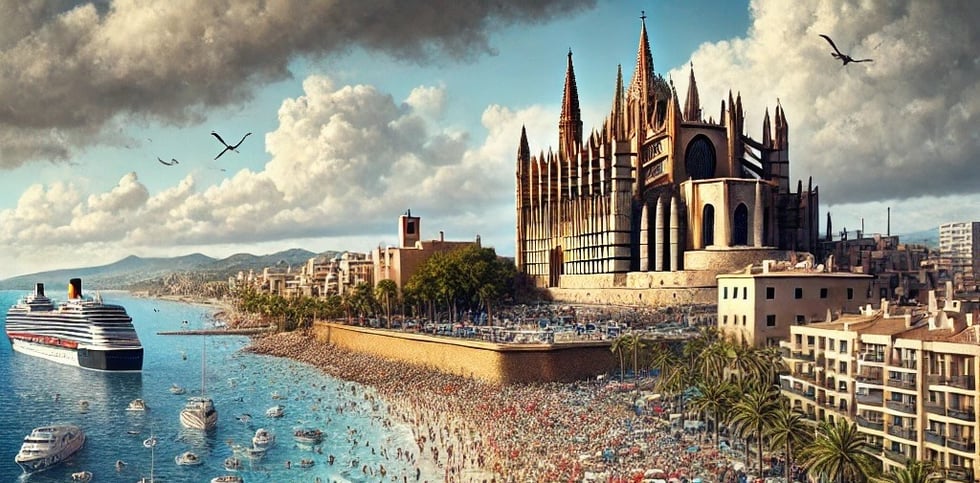

Mallorca’s Tourism Conundrum: Striking the Right Balance
Tourism has long been a vital part of Mallorca’s identity, contributing to economic growth, job creation, and the island’s global appeal. However, this reliance on tourism has brought with it a host of challenges that have caused growing frustration among local residents. In this post, we explore the complex issues surrounding Mallorca’s tourism industry, the rise of anti-tourism sentiment, and potential solutions to strike a balance between economic prosperity and sustainable development.
The Economic Backbone of Mallorca
Tourism has been the driving force behind Mallorca’s economy for decades. As of 2022, the sector accounted for 45% of the island’s Gross Domestic Product (GDP), making it one of the most tourism-reliant regions in Spain. This dependency has translated into job creation across various industries, from hospitality to transport and retail. During peak tourist seasons, more than 30% of the local workforce is employed in tourism-related roles.
Despite these benefits, the island’s economic structure shows significant vulnerability. The COVID-19 pandemic exposed this fragility when Mallorca’s GDP contracted by nearly 23% in 2020, one of the largest declines in Spain. The labour market is similarly impacted, with unemployment fluctuating from around 10% during high seasons to as much as 20% in off-peak periods. Although international travel has resumed, employment remains seasonal and precarious, with many locals dependent on temporary or part-time contracts.
A Push for Diversification
Recognising the risks of over-dependence on tourism, local authorities are promoting economic diversification. Agriculture, renewable energy, and technology have emerged as promising sectors. Olive and almond farming, along with vineyards, contribute to the rural economy, though agriculture represents less than 3% of GDP. More significantly, renewable energy initiatives are gaining ground, with Mallorca aiming to meet 35% of its energy needs from renewable sources by 2030. In parallel, the island’s capital, Palma de Mallorca, is becoming a hub for tech startups and digital nomads, offering potential beyond the tourism sector.
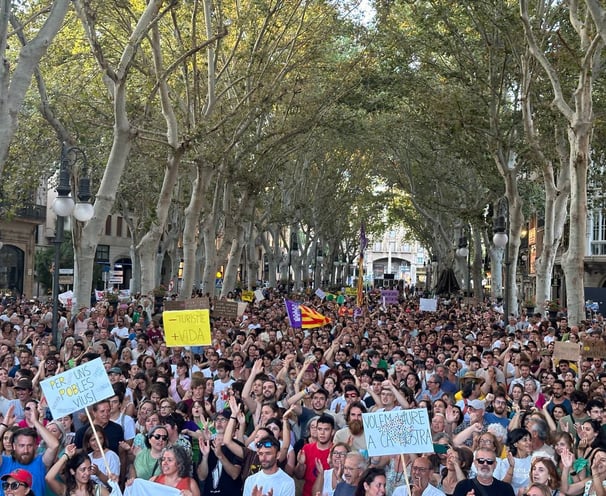

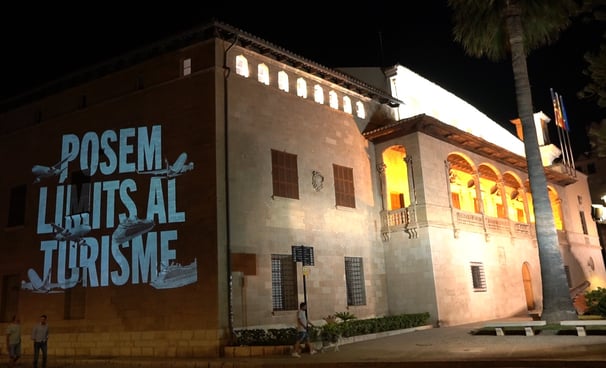

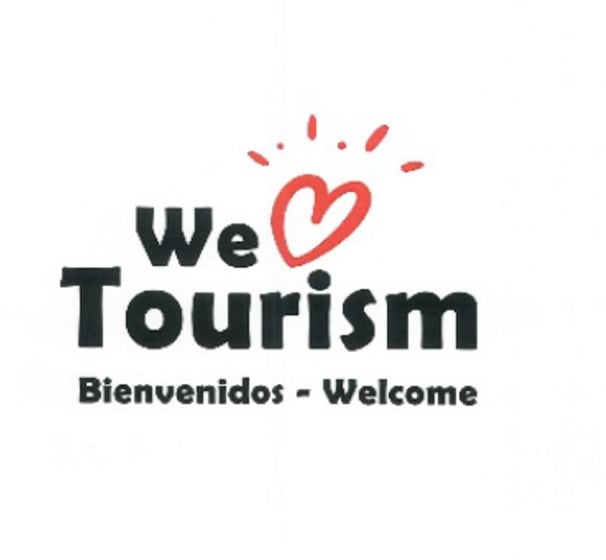

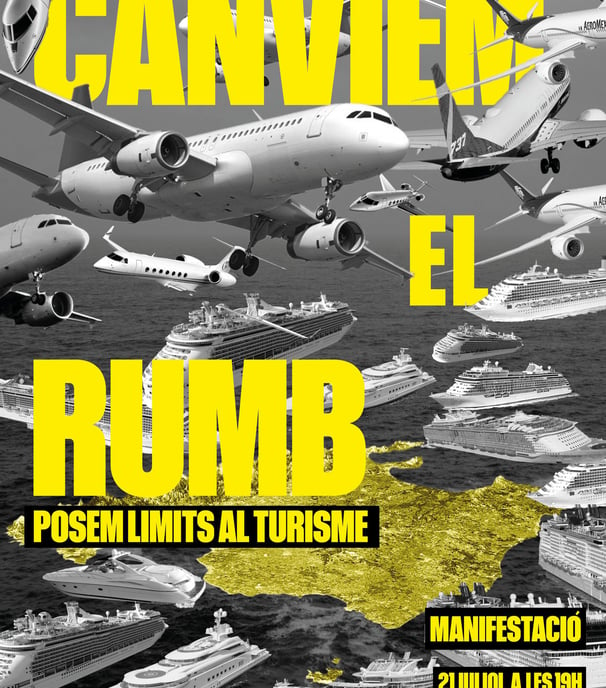

The Rise of Anti-Tourism Sentiment
While tourism has brought prosperity to Mallorca, it has also sparked growing discontent among local residents, giving rise to an anti-tourism movement. This frustration stems from several factors, including economic inequality, environmental degradation, and the erosion of the island’s traditional way of life.
Economic Inequality and Housing Challenges
The benefits of tourism are not evenly shared. A significant portion of the wealth generated by the industry is captured by large, often foreign-owned hotel chains and property developers. For local residents, this has contributed to an increase in living costs, particularly in the housing market. The surge in demand for holiday homes and short-term rentals, driven by wealthy tourists and investors, has caused property prices and rents to skyrocket. In some areas, rental prices have risen by over 40% in the past decade, making it increasingly difficult for locals to afford housing.
Seasonal tourism jobs, often low-paid and insecure, exacerbate the economic divide. Many locals feel that while tourists enjoy the benefits of Mallorca’s beauty and culture, they are left facing the consequences—higher costs of living and diminished job security.
Environmental Strain and Sustainability Issues
Mallorca’s natural environment is one of its greatest assets, attracting millions of visitors each year. However, the pressure on the island’s ecosystems is becoming unsustainable. Overcrowded beaches, damaged marine habitats, and increased pollution are taking their toll. The island’s water resources are especially strained during the peak summer months when tourist numbers swell. On average, tourists consume two to three times more water per day than locals, compounding the strain on Mallorca’s limited freshwater supply.
Waste management and energy consumption are additional challenges, with infrastructure often struggling to cope with the surge in demand during high season. While local authorities have introduced initiatives like waste recycling and restrictions on visitor numbers to sensitive areas such as the Tramuntana Mountains, these measures are still insufficient to counteract the broader environmental damage caused by mass tourism.
Social and Cultural Impact: A Loss of Identity
Beyond economic and environmental issues, the cultural impact of tourism is increasingly evident. As tourists flood Mallorca, the island’s traditional way of life feels under threat. Historic areas in Palma and coastal towns have seen a surge in tourist-focused developments—shops, restaurants, and apartments catering to visitors—pushing out local residents and businesses. This transformation has eroded the authentic character of Mallorca’s towns and villages, with many locals feeling alienated in their own communities.
The influx of “party tourism” in places like Magaluf and Playa de Palma has further aggravated tensions. Excessive noise, public disorder, and rowdy behaviour have led to complaints from residents about the disruption to their quality of life.
The Role of Social Media in Amplifying Discontent
Social media has become a powerful platform for amplifying anti-tourism sentiment. Campaigns such as “Mallorca is not for sale” (Mallorca No Se Vende) have gained momentum, with locals using social media to highlight the negative impacts of mass tourism. Viral posts and images showcasing overcrowded beaches or disruptive tourist behaviour have only intensified calls for reform.
Government Response and Potential Solutions
In response to the rising anti-tourism sentiment, the Balearic government has implemented several measures aimed at managing tourism more sustainably. These include introducing a tourist tax, capping the number of holiday rentals, and limiting the number of cruise ships docking in Palma. However, these actions have met with mixed reactions. While some residents welcome the changes, others argue that more needs to be done to address the root causes of Mallorca’s tourism challenges.
The Role of Airbnb in the Housing Crisis
Airbnb and other short-term rental platforms have also played a significant role in exacerbating the housing crisis. By making it easier for property owners to rent out their homes to tourists, these platforms have driven up property values, making it difficult for locals to compete. The gentrification of neighbourhoods, especially in Palma, has become a growing concern, as local businesses are displaced and communities lose their cultural character.
A Path Forward: Solutions for Sustainable Tourism
Addressing Mallorca’s tourism conundrum requires a multifaceted approach. Here are some potential solutions that could help the island achieve a more sustainable future:
• Sustainable Tourism Practices: Implementing stricter regulations to minimise waste, conserve water, and protect biodiversity is essential. Promoting eco-friendly tourism could help reduce the industry’s environmental impact.
• Economic Diversification: Reducing dependence on tourism by investing in sectors like agriculture, renewable energy, and technology would help stabilise the economy and reduce seasonal fluctuations.
• Community-Based Tourism: Involving local communities in tourism planning can ensure that the benefits are shared more equitably. Supporting local businesses and preserving cultural heritage should be central to tourism policies.
• Stronger Regulation and Enforcement: Stricter regulations around construction, noise pollution, and environmental standards can help manage the pressures of tourism. Limiting the expansion of holiday rentals and enforcing sustainability standards are also crucial.
• Education and Awareness: Encouraging responsible tourism through public awareness campaigns can foster greater understanding and respect between tourists and locals.
Conclusion: Finding a Balance for Mallorca’s Future
Mallorca’s future lies in finding a delicate balance between its tourism industry and the need to protect its environment, culture, and residents’ quality of life. By embracing a more sustainable and equitable approach to tourism, the island can continue to thrive as a top destination while ensuring that it remains a place where locals can live, work, and prosper. As the anti-tourism sentiment grows, so too does the call for a more thoughtful, balanced approach—one that prioritises long-term wellbeing over short-term gains.
